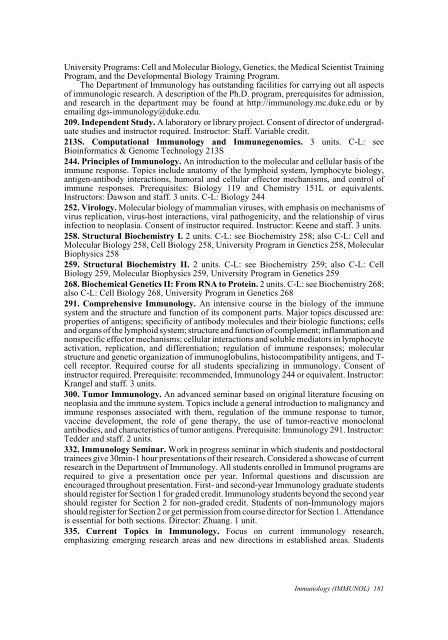2005-06 - Office of the Registrar - Duke University
2005-06 - Office of the Registrar - Duke University
2005-06 - Office of the Registrar - Duke University
You also want an ePaper? Increase the reach of your titles
YUMPU automatically turns print PDFs into web optimized ePapers that Google loves.
<strong>University</strong> Programs: Cell and Molecular Biology, Genetics, <strong>the</strong> Medical Scientist Training<br />
Program, and <strong>the</strong> Developmental Biology Training Program.<br />
The Department <strong>of</strong> Immunology has outstanding facilities for carrying out all aspects<br />
<strong>of</strong> immunologic research. A description <strong>of</strong> <strong>the</strong> Ph.D. program, prerequisites for admission,<br />
and research in <strong>the</strong> department may be found at http://immunology.mc.duke.edu or by<br />
emailing dgs-immunology@duke.edu.<br />
209. Independent Study. A laboratory or library project. Consent <strong>of</strong> director <strong>of</strong> undergraduate<br />
studies and instructor required. Instructor: Staff. Variable credit.<br />
213S. Computational Immunology and Immunegenomics. 3 units. C-L: see<br />
Bioinformatics & Genome Technology 213S<br />
244. Principles <strong>of</strong> Immunology. An introduction to <strong>the</strong> molecular and cellular basis <strong>of</strong> <strong>the</strong><br />
immune response. Topics include anatomy <strong>of</strong> <strong>the</strong> lymphoid system, lymphocyte biology,<br />
antigen-antibody interactions, humoral and cellular effector mechanisms, and control <strong>of</strong><br />
immune responses. Prerequisites: Biology 119 and Chemistry 151L or equivalents.<br />
Instructors: Dawson and staff. 3 units. C-L: Biology 244<br />
252. Virology. Molecular biology <strong>of</strong> mammalian viruses, with emphasis on mechanisms <strong>of</strong><br />
virus replication, virus-host interactions, viral pathogenicity, and <strong>the</strong> relationship <strong>of</strong> virus<br />
infection to neoplasia. Consent <strong>of</strong> instructor required. Instructor: Keene and staff. 3 units.<br />
258. Structural Biochemistry I. 2 units. C-L: see Biochemistry 258; also C-L: Cell and<br />
Molecular Biology 258, Cell Biology 258, <strong>University</strong> Program in Genetics 258, Molecular<br />
Biophysics 258<br />
259. Structural Biochemistry II. 2 units. C-L: see Biochemistry 259; also C-L: Cell<br />
Biology 259, Molecular Biophysics 259, <strong>University</strong> Program in Genetics 259<br />
268. Biochemical Genetics II: From RNA to Protein. 2 units. C-L: see Biochemistry 268;<br />
also C-L: Cell Biology 268, <strong>University</strong> Program in Genetics 268<br />
291. Comprehensive Immunology. An intensive course in <strong>the</strong> biology <strong>of</strong> <strong>the</strong> immune<br />
system and <strong>the</strong> structure and function <strong>of</strong> its component parts. Major topics discussed are:<br />
properties <strong>of</strong> antigens; specificity <strong>of</strong> antibody molecules and <strong>the</strong>ir biologic functions; cells<br />
and organs <strong>of</strong> <strong>the</strong> lymphoid system; structure and function <strong>of</strong> complement; inflammation and<br />
nonspecific effector mechanisms; cellular interactions and soluble mediators in lymphocyte<br />
activation, replication, and differentiation; regulation <strong>of</strong> immune responses; molecular<br />
structure and genetic organization <strong>of</strong> immunoglobulins, histocompatibility antigens, and Tcell<br />
receptor. Required course for all students specializing in immunology. Consent <strong>of</strong><br />
instructor required. Prerequisite: recommended, Immunology 244 or equivalent. Instructor:<br />
Krangel and staff. 3 units.<br />
300. Tumor Immunology. An advanced seminar based on original literature focusing on<br />
neoplasia and <strong>the</strong> immune system. Topics include a general introduction to malignancy and<br />
immune responses associated with <strong>the</strong>m, regulation <strong>of</strong> <strong>the</strong> immune response to tumor,<br />
vaccine development, <strong>the</strong> role <strong>of</strong> gene <strong>the</strong>rapy, <strong>the</strong> use <strong>of</strong> tumor-reactive monoclonal<br />
antibodies, and characteristics <strong>of</strong> tumor antigens. Prerequisite: Immunology 291. Instructor:<br />
Tedder and staff. 2 units.<br />
332. Immunology Seminar. Work in progress seminar in which students and postdoctoral<br />
trainees give 30min-1 hour presentations <strong>of</strong> <strong>the</strong>ir research. Considered a showcase <strong>of</strong> current<br />
research in <strong>the</strong> Department <strong>of</strong> Immunology. All students enrolled in Immunol programs are<br />
required to give a presentation once per year. Informal questions and discussion are<br />
encouraged throughout presentation. First- and second-year Immunology graduate students<br />
should register for Section 1 for graded credit. Immunology students beyond <strong>the</strong> second year<br />
should register for Section 2 for non-graded credit. Students <strong>of</strong> non-Immunology majors<br />
should register for Section 2 or get permission from course director for Section 1. Attendance<br />
is essential for both sections. Director: Zhuang. 1 unit.<br />
335. Current Topics in Immunology. Focus on current immunology research,<br />
emphasizing emerging research areas and new directions in established areas. Students<br />
Immunology (IMMUNOL) 181









